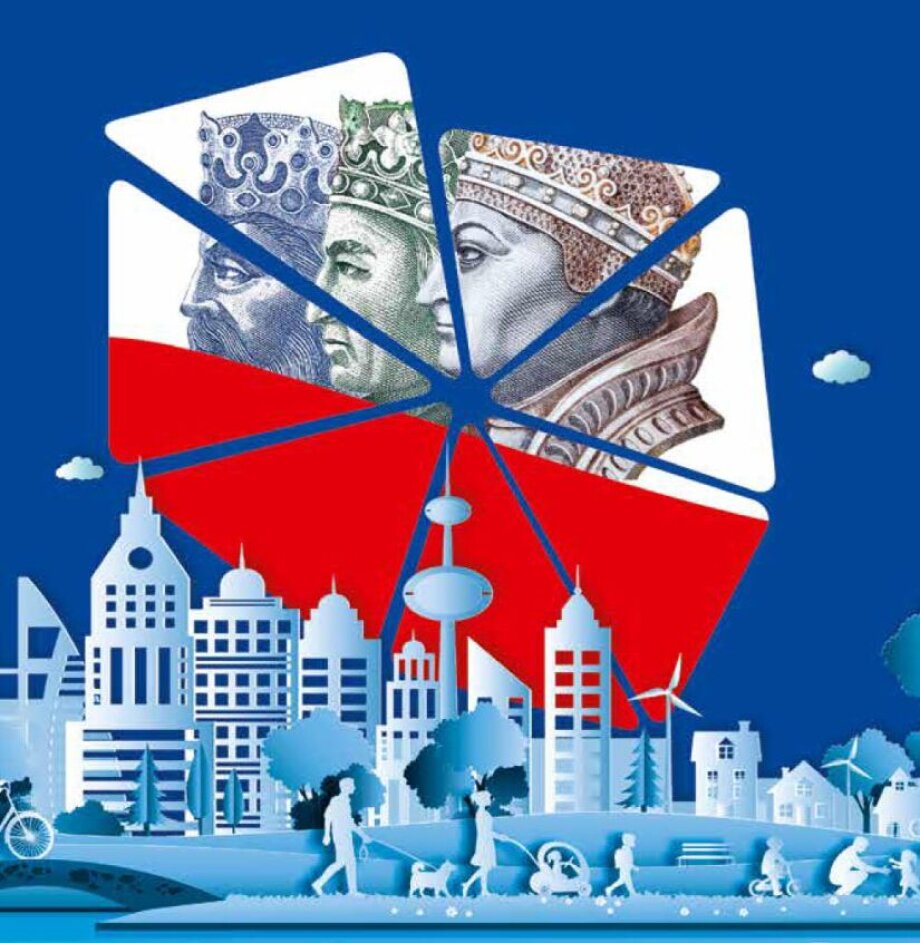The original American "New Deal" was an attempt to change the paradigm. Thanks to it, the state was becoming an important player in the economy. Taxes rose dramatically. In the meantime, state investments emerged. The "New Deal" was in line with the economic theories of John Maynard Keynes, who emphasized that if consumption was too small, it should be stimulated and increased. Although the "Polish Deal" is more a correction of the regulations than a fundamental change of the economic system, it is packed spectacularly — with its own website and logo and presented as a film premiere, with more attention to presentation and little to the content.
A TELLTALE OR A TALL TALE?
“Polish Deal” is not a program to fight the pandemic. It's a beautifully crafted promise. It is what the rulers claim it to be. “It is to fulfill Polish aspirations, or maybe something more difficult, Polish dreams,” said Jarosław Kaczyński, the de facto leader of Poland’s governing rightwing PiS party, during the presentation of the “Polish Deal,” proposing to make a huge developmental leap to achieve prosperity that is shared by the residents of the wealthiest countries in Europe and proposing to build a "Polish welfare state." It is for such occasions that the Czech writer Milan Kundera in his book “The Unbearable Lightness of Being” (1984) wrote that when the heart speaks, the mind finds it indecent to object. In the realm of kitsch, the dictatorship of the heart reigns supreme. The feeling induced by kitsch must be the kind multitudes can share.
It is worth separating the propaganda layer from the actual assumptions and looking at the reason for introducing the program. For a long time, the same argument has been constantly present in the public debate — social justice. This is an argument that is difficult to argue against. Free-market solutions may be effective but they generate inequalities. Of course, the idea of reducing inequalities may seem noble, even moral, which explains its appeal. Its supporters will advertise that their goal is to help the poorest and weakest. In particular, it talks to those who still see the world through the prism of class struggle and the clash of rich and poor. “Polish Deal” is a response to such a call. A vision of a world where high taxes are fair, government intervention is welcomed and equality is more important than freedom and economic growth. In democracies where voters vote for solutions designed specifically for their income group, those programs that are targeted toward the widest group of the population typically gain popularity.
WHAT’S THE DEAL?
Although the "Polish Deal" once again offers, besides the 500+ child benefit program, additional financial incentives to people with children, taxes are the most important and more specific area of the proposed changes. There are three main points in the “Polish Deal.” The first is an increase in the tax-free amount, which is to increase from PLN 8,000 to PLN 30,000. It is a long-awaited and clearly positive change. The second important announcement is the raising of the second tax threshold from PLN 85,528 up to PLN 120,000. This threshold has not been changed for 14 years, which means that currently workers earning slightly above the national average exceed this sample and pay a higher, 32% tax. This, too, is to be considered a move in the right direction. Both of these changes will be costly for the budget because everyone will benefit from them, while more money is needed for other government programs. Typically, governments lower some taxes with one hand and raise them with the other. This is the case with the “Polish Deal,” as it plans to change the method of calculating the health insurance contribution. Currently, health insurance premium (9%) is calculated on an amount lower than a person’s gross salary, and of this amount 7.75% is tax-deductible. Under the Program, the health insurance contribution will become non-deductible. Individuals running a business will be required to pay a health insurance contribution calculated in proportion to their income at the rate of 9%, without the possibility of deducting it from tax. A painful stab in the back of those who use private health insurance.
The government claims that the changes will be positive or neutral for the vast majority of taxpayers. All those who earn less than PLN 5,000 gross are to be on the “winners’” side. Actually, only two social groups will benefit from significant benefits: people earning near the minimum wage and the majority of retirees, that is, the majority of supporters of PiS. Corporations, entrepreneurs, a large proportion of the self-employed, and people earning over PLN 11,500 (€2,500) gross will lose the most. The goal of social engineering here is the flow of income from middle and high earners to the lowest income. The implementation of the idea of social justice will result in an increase in consumption, as people from lower-income groups are characterized by a lower saving rate and a higher propensity to consume than people from higher-income groups. As a result, it is a program geared towards increasing consumption at the expense of savings. But also, interestingly, at the expense of investments, because since 2016 we have been dealing in Poland an increase in social transfers (500+, 13th, and 14th pensions), accompanied by a declining investment rate. The rate of investment depends on the savings rate, not the other way round. This will lead to a reduction in the future production potential of the Polish economy and, consequently, to a slowdown in productivity growth. When confronted with the increase in consumer demand, this will result in greater pressure on price increases and, consequently, higher inflation.
AT WHAT COST?
The authors of the “Polish Deal” estimated its total costs at PLN 650 billion in 2021-30, which is PLN 72 billion annually. Increasing the tax-free amount while recognizing the separation of the health insurance contribution as a separate tax means an increase in the pool of money for the state medical sector, but also more pressure on the state budget and increase of deficit and public debt. Admittedly, the government already started to withdraw from some of the proposals under pressure from businesses and introduce the first amendments to the already announced program, but entire legal acts are yet to come. To sum up, the behavior of the state is a bit like a wanna-be entrepreneur living on a credit who would buy a Ferrari first, then a Valentino suit followed by an expensive watch, and when they have it all, they start drawing up a business plan, which says that assumptions need to be changed.
In the introduction to the "Polish Deal," we can read: “The history of world crises teaches one thing. In an uncertain time, it is up to the state to take the initiative and take responsibility. This was the case in the 1930s when the “New Deal” was created in response to the Great Depression. This was what happened after the war when Europe was rebuilt thanks to the Marshall Plan. It must be so now.” Unfortunately, this is the one-sided version in which only politicians and officials "buildup" the economy. In fact, it’s quite the opposite — it is ordinary people and their work coordinated by entrepreneurs that create wealth that society can benefit from. Increasing the redistribution of income from entrepreneurs, the best educated and hardworking, to the inactive and the lowest-paid employees cannot ensure sustainable economic development.
“Polish Deal” seems to be a policy that demotivates people to educate themselves, work harder and take economic risks. It favors a demanding attitude and prefers state investments, steered by politically appointed officials, with a questionable rate of return over projects implemented by the private sector. Based on the redistribution of income, promotion of consumption at the expense of savings, and increasing the role of the state in the economy, the "Polish Deal" will not help Poland achieve prosperity. It is beautifully packaged and attractive in scope, so it will speak charmingly to the hearts of most of the citizens.
“POLISH DEAL” — the most important assumptions:
• increasing spending on state health funds to 7% in relation to GDP
• increasing the tax-free amount to PLN 30,000
• raising the second tax threshold from PLN 85,000 to PLN 120,000 annually
• abolition of certain contracts (umowa o dzieło/specific-task contract)
• act on the quality of medical services, establishment of the Hospital Modernization Fund
• construction of single-family buildings with a development area of up to 70 sqm will be possible only on the basis of notification, without the approval of bureaucrats
• the act on the family farm, an agricultural code will be developed
• 4,000 community centers, 100 swimming pools, 300 sports fields in municipalities
• the creation of professional artists occupation
• history will be taught in schools in two currents: universal history and Polish history
• the Saski Palace will be rebuilt
• pensions up to PLN 2,500 without tax
• unlimited admissions to free specialist doctors
• support for the parents in the first three years after the birth of a child, family care capital - PLN 12,000 to be used between the 12th and the 36th month of a child's life,
• housing program: there will be a state guarantee of own contribution up to the amount of PLN 100,000 when buying an apartment; in the case of the second and subsequent children, cancellation of a loan taken up to PLN 150,000.
• investment program; establishment of an Investment Fund worth PLN 650 billion within 5-7 years.
• 2,500km of new roads and highways in the next seven years,
• broadband internet for homes that do not have it yet
• free prenatal tests for women 40+, financed from public funds
• students will be provided with psychological help


















